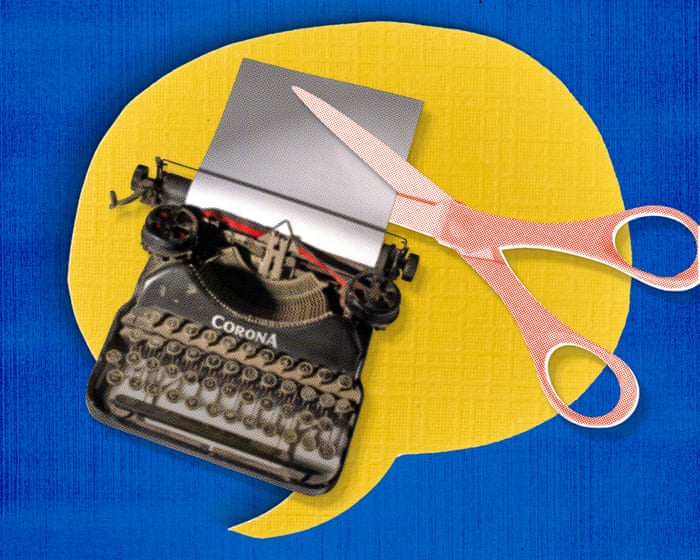In 1984, near the end of my university days, I wrote a letter applying for a job as an advertising copywriter. As a history student, I asked a laid-back friend studying English to look it over. One sunny morning, he read it while lounging on a sofa. “Well,” he said, handing it back, “there are too many words in it.”
I picked the letter up from the floor and reread the opening: “Dear sir or madam, I wonder whether, by any chance, I might prevail on you …”
“See what I mean?” my friend said, lighting a cigarette and tossing the pack to me.
I did see. Scanning the letter again—noticing phrases like “I realise that my application is bound to be something of a long shot”—I felt a rush of emotions. First, embarrassment at my clumsiness; then, gratitude to my friend for sharing the magic word that was surely the secret to his own polished English. That word was “cut.”
I returned to my room and got to work. Once I’d trimmed it down, the letter suddenly sounded like it came from a credible person. I hadn’t suddenly learned how to write—I’d learned how not to write. It was a revelation, the first time I thought my dream of becoming an author might actually be possible.
During my undergraduate years, I’d sometimes sent articles to newspapers on a whim. They were always rejected, but occasionally with an encouraging note—”Do keep us in mind, though”—that would send me dancing around my room. I was also constantly tinkering with a story about a young man who traveled by train between London and Yorkshire, living two completely separate lives. It was a kind of northern kitchen-sink drama, thirty years too late and bogged down with details. I even bored myself starting a paragraph with, “He walked through Camden to King’s Cross station …” But after talking to my friend, that became, “At King’s Cross …” With a simple cut, I’d worked a kind of magic: I’d made my protagonist levitate.
After graduation, while working office jobs in London, I scribbled stories during lunch breaks or on the tube. My path to publication was winding, but the mantra “cut” shone ever brighter. On Sunday evenings, I’d take my notebooks to a pub with a red pen in my pocket. I remember those evenings as rainy, and just as the rain washed away the messy misadventures of the week, I was cleansing my flawed prose. “Was it tiredness that was afflicting him?” gave way to “He was, he supposed, tired.” If the new version was a little mysterious, so much the better.
Before submitting my work, I typed it on a huge Imperial typewriter—a machine that didn’t tolerate second thoughts. Sure, there was Tipp-Ex, but I’d always apply it too thinly at first, leaving the unwanted word visible underneath, then too thickly, so it dripped down and erased a perfectly good word on the line below. A breakthrough came around 1990 when I bought an Amstrad computer with word processing. Now I could play with words the way others were starting to play video games. Just as Pac-Man gobbled dots, my cursor devoured words. I should have cut even more, as I realized in 1999 when reviewing the proofs of my first novel. But without my friend’s advice, there would have been no novel at all.
I’ve often wondered if his private school education—which I didn’t have—made the difference. A private education instills confidence, and you need confidence to edit yourself, to believe something worthwhile will remain. My friend, still laid-back and still my friend, wouldn’t mind me mentioning that. But what I really want to tell him is a word I’m not sure I said back then: “Thanks.”Andrew Martin is an author whose newest book, “The Night in Venice,” has been released by Weidenfeld & Nicolson.
Frequently Asked Questions
Of course Here is a list of helpful and concise FAQs based on the advice to trim overwrought writing
FAQs Trimming Overwrought Writing
Beginner Questions
1 What does overwrought writing mean
Its writing that is overly complex uses too many fancy words or is unnecessarily long It often makes simple ideas sound complicated and can be exhausting for a reader
2 Whats the main benefit of trimming my writing
It makes your writing clearer more powerful and easier for readers to connect with Clear prose keeps people engaged and lets your story shine through
3 How can I tell if my own writing is overwrought
Read it aloud If you stumble over sentences get out of breath or find yourself thinking What was I trying to say here its a good sign it needs to be trimmed
4 Can you give me a simple example
Overwrought He utilized his lower extremities to perambulate with alacrity toward the culinary preparation area
Trimmed He hurried to the kitchen
5 Where should I start when trying to trim my writing
Start by looking for long phrases that can be replaced with one strong word and cut any words that dont add new meaning or imagery
Advanced Practical Questions
6 Isnt descriptive flowery writing good for setting a scene
Description is vital but it must be effective One precise powerful detail is better than five vague ornate ones Focus on quality of description not quantity of words
7 What are the most common filler words I should look for
Watch for words like very really quite somewhat in order to that and began to Often you can remove them without changing the sentences meaning
8 How do I balance trimming with developing my unique voice
Trimming doesnt mean making your writing bland It means removing the clutter so your true voice can be heard more clearly Your unique perspective and rhythm will remain
9 Whats a good editing technique for this
Try the 50 Rule Take a paragraph youve written and challenge yourself to cut its word count in half without losing the core meaning This forces you



